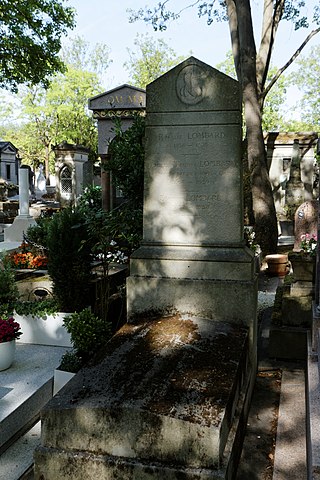Top Qs
Timeline
Chat
Perspective
Étienne Lombard
From Wikipedia, the free encyclopedia
Remove ads
Étienne Lombard (French pronunciation: [etjɛn lɔ̃baʁ]; 1869–1920) was a French otolaryngologist and surgeon who discovered the Lombard effect, in which a person's voice is involuntarily raised when speaking in a loud environment.[1][2][3][4]

He was at the Lariboisiere Hospital, the first "oto-rhino-laryngologiste des Hopitaux" in France.[1] He developed new surgical techniques and a new form of bone forceps.[4] During World War I he researched the effects of air blasts upon 600 aviators but was unable to continue this research due to an illness that resulted in his early death.[4]
The "symptom of the raised voice" was discovered in 1909.[2] It was made possible by the invention of a device by the Viennese physician Robert Bárány that delivered an intense noise to only one ear and so allowed the monaural examination of the other ear.[5] Using this device Lombard asked a person to start talking in conversation while hearing noise. He found that when the noise began, the person spoke louder, and when the noise stopped, the voice returned to a normal level.[1]pp. 678–680
The finding was reported to the French Academy of Sciences in August 1909,[2] and the following year in April to the French Academy of Medicine.[6] However, in 1910 German publications attributed this discovery to Robert Bárány, which led to a dispute in print between them. Priority was established when the English physician, Donald Schearer, described how he carried news of the discovery from Paris to Vienna in November 1909.[1]pp. 677–678 Bárány received the Nobel Prize in Physiology or Medicine in 1914, for other work.
Lombard's discovery is important for four reasons.[1]
- It provides a means of detecting malingering by simulated hearing loss
- It underlies research into speech communication in noise (an important practical problem)
- It helps researchers understand how imitation and speaking are altered by auditory feedback
- It identifies a role in speech of processes involving servomechanism.
He is buried in the Père Lachaise Cemetery in Paris. A photo of him is reprinted in.[7]
Remove ads
References
Wikiwand - on
Seamless Wikipedia browsing. On steroids.
Remove ads
